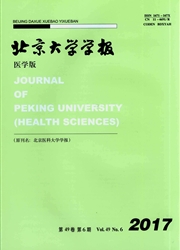

 中文摘要:
中文摘要:
目的:探讨高糖对肾小球足细胞podocalyxin蛋白表达的影响及其信号途径。方法:免疫组织化学法检测db/db(自发糖尿病小鼠)肾小球足细胞podocalyxin蛋白表达,野生型小鼠(WT鼠)为对照,计算机图像半定量分析。以体外培养的足细胞为研究对象,应用Western印迹分析技术,检测高糖培养不同时间点对足细胞表达podoca-lyxin蛋白的影响;检测细胞外信号调节激酶(ERK1/2)信号途径的活化,及其特异性阻断剂PD98059对podocalyx-in蛋白变化的阻断效应。结果:免疫组织化学半定量分析显示db/db小鼠肾小球podocalyxin蛋白表达明显少于对照组[(0.18±0.07)比(0.25±0.05),P〈0.05]。培养的足细胞表达基础水平的podocalyxin蛋白,高糖培养不同时间点其表达均下降,以第6天最明显(为对照组的5.5%,P〈0.01),正常糖和甘露醇组没有明显变化。高糖可以活化足细胞ERK1/2信号途径,于培养30min时ERK1/2开始活化,6h达高峰,持续活化至24h,至48h时接近基础水平;高糖培养不能活化P38和JNK。正常糖和甘露醇在各个时间点均不影响丝裂原活化蛋白激酶(MAPK)信号转导通路。ERK1/2特异阻断剂PD98059可以消减高糖引起的podocalyxin表达下降的效应。结论:自发糖尿病小鼠的肾小球足细胞podocalyxin蛋白表达下降。高糖经ERK1/2信号通路下调体外培养的足细胞podocalyxin蛋白表达。
 英文摘要:
英文摘要:
Objective:To examine the expression of podocalyxin protein in glomerular podocytes by long-term high glucose exposure in vitro and in vivo. Methods: Immunohistochemical staining and computer image analysis were applied to detect the expression of podocalyxin protein in glomeruli from db/db mice and Wt mice. The effects of high glucose on the expression of podocalyxin protein were analized by Western blotting. The activation of MAPKS signaling pathway ( ERK, p38 and JNK) by high glucose was also examined. Results: The expressions of podocalyxin protein in db/db mice were obviously less than that in Wt mice [ (0.18± 0.07 ) vs (0.25 ± 0.05 ), P 〈 0.05 ] assessed by immunostainning and semi- quantitative analysis. Basal levels of podocalyxin protein were observed in cultured mouse podocytes. The level of podocalyxin protein declined at each time point by high glucose incubation, reached the lowest level on the 6th day (5.5% of control group, normal glucose and mannitol glucose incubation P 〈0. 01 ), but no significant changes were observed in groups. High glucose medium induced phosphorylation of ERK1/2 as early as 30 minutes, reached the peak at hour 6; maintained the activation from hour 12 to 24, and declined to the basal level at hour 48. However, activation of ERK1/2 was not detected in normal glucose and mannitol glucose groups. Blockade of activation of ERK1/2 with PD98059, a specific ERK1/2 activation inhibitior, attenuated the high glucose-induced expression of podocalyxin protein on the 6 th day. Conclusion : High ambient glucose decreases the protein level of podocalyxin by podocyte in vitro and in vivo, and the decrease in podocalyxin protein is ERK1/2-dependent in cultured podocytes.
 同期刊论文项目
同期刊论文项目
 同项目期刊论文
同项目期刊论文
 Connective tissue growth factor increases matrix metalloproteinase-2 and suppresses tissue inhibitor
Connective tissue growth factor increases matrix metalloproteinase-2 and suppresses tissue inhibitor Increase in extracellular cross-linking by tissue transglutamiase and reduction in expression of MMP
Increase in extracellular cross-linking by tissue transglutamiase and reduction in expression of MMP 期刊信息
期刊信息
